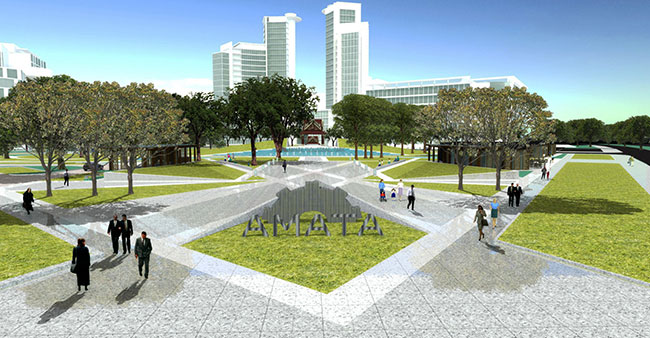Amata Vietnam celebrates the 20th anniversary

The 20th anniversary ceremony of Amata Vietnam, themed “Drive to Future”, marks an important milestone in the company's journey, and sets the stage for their ambitious achievements yet to come. Chief among the aims of Amata's founder, Vikrom Kromadit, is the creation of perfect cities.
Amata Vietnam Co., Ltd. was established in December 1994 as a joint venture project between Thailand’s Amata Corporation Public Company Limited and Sonadezi Bien Hoa, a state-owned developer of industrial estates in Dong Nai province. Covering a total area of 700 hectares, the industrial park was developed in Bien Hoa city of the province and officially put into service in 1995.
Strategically located in the centre of the key southern economic hub, Amata Bien Hoa boasts easy access to all essential facilities for business operations. This complex has become a favoured destination for investors in tandem with Vietnam's booming development.
With its long-term vision and comprehensive support services, Amata Bien Hoa – also dubbed “Perfect City” by its developers – has achieved considerable success, making a valuable contribution to the socio-economic development of Bien Hoa, and indeed Dong Nai as well.
Amata Vietnam has followed Amata Corporation's concept of a Perfect City, whereby a township with amenities must be built nearby industrial estates to provide homes for the workers.
Under its master plan, Amata Vietnam has run the two projects including Amata Industrial Park and Amata Commercial Complex, which have been merged to form the well-known industrial city.
Amata Industrial Park is one of the top choices of foreign investors in Vietnam due to its strategic location and well-developed facilities. As of August 2015, the park was home to 145 investors from 21 countries and territories with $2.34 billion of investment capital and nearly 43,000 employees. The majority of Amata's clients are leading multinational corporations with globally-recognised brands such as Nestle, Pesico, Toshiba, Shiseido, Marigot, Bayer, Kao, and Ritek.
Meanwhile, Amata Commercial Complex saw its first tenant in 2009 and second tenant in 2010 – Honda Showroom and Lotte Mart, respectively. Together with Amata Service Centre, these projects occupy the most attractive “frontage” spaces along the National Road 1A.
The complex has nurtured new businesses and communities, while promoting a good quality of living, working and playing within the same site to meet the needs of both employers and their families. Amata Commercial Complex features a commercial hub, leisure and sports facilities, a residential area, a hotel, banks, shopping centres, international schools, clinics and Amata Square.
Amata Square is a 2.2ha public park for outdoor activities, which is considered “the lung” of Amata. The square will be a landmark for the area, inspired by the culture and history of both Bien Hoa and Thailand.
With the investment capital of $1.2 million, Amata Vietnam is steadfast in its commitment to improving the living environment of the community. Amata Square was officially opened to the public on December 18, 2015 to celebrate Amata's 20th anniversary.
In addition, a book entitled 20 years of Amata Vietnam and the vision to the ASEAN Economic Community (AEC) will be launched at the event. The book was written by the founder of Amata Corporation, Vikrom Kromadit, and Dr Surin Pitsuwan, the Secretary General of ASEAN during 2008 – 2012. This is Vikrom's third book in Vietnamese, following the success of his previous two which sold over 40,000 copies in Vietnam.
The book reviews Amata’s investment and achievements in Vietnam over the past 20 years, while raising awareness about the AEC. It also features an interview with Vietnamese Deputy Prime Minister cum Foreign Affairs Minister Pham Binh Minh, and Minister of Planning and Investment Bui Quang Vinh, both of whom shared their vision for Vietnam within the wider context of the AEC.
What the stars mean:
★ Poor ★ ★ Promising ★★★ Good ★★★★ Very good ★★★★★ Exceptional
Latest News
More News
- Vietnam sets ambitious dairy growth targets (February 24, 2026 | 18:00)
- Masan Consumer names new deputy CEO to drive foods and beverages growth (February 23, 2026 | 20:52)
- Myriad risks ahead, but ones Vietnam can confront (February 20, 2026 | 15:02)
- Vietnam making the leap into AI and semiconductors (February 20, 2026 | 09:37)
- Funding must be activated for semiconductor success (February 20, 2026 | 09:20)
- Resilience as new benchmark for smarter infrastructure (February 19, 2026 | 20:35)
- A golden time to shine within ASEAN (February 19, 2026 | 20:22)
- Vietnam’s pivotal year for advancing sustainability (February 19, 2026 | 08:44)
- Strengthening the core role of industry and trade (February 19, 2026 | 08:35)
- Future orientations for healthcare improvements (February 19, 2026 | 08:29)
















 Mobile Version
Mobile Version